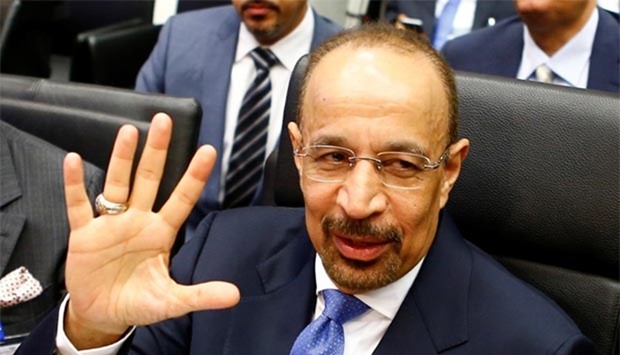Saudi Arabia expressed confidence on Thursday that oil prices will keep recovering, cementing expectations that a divided Opec will decide to keep crude gushing at its meeting in Vienna.
"Everybody is very satisfied with the market. The market is rebalancing as we speak," said Khalid al-Falih, newly appointed by the kingdom's powerful and dynamic new crown prince.
"Demand is extremely healthy and robust. Non-Opec supply is declining. Prices will respond to the rebalancing of the market," Falih told reporters.
Traditionally the Organisation of the Petroleum Exporting Countries, which pumps around a third of the world's oil, has cut production to boost falling prices.
But in the most recent drop, which has seen oil tumble from over $100 in 2014 to close to $25 in January, Opec -- driven by kingpin Saudi Arabia -- has changed tack.
Experts say the group has kept the oil flowing in order to squeeze competitors -- particularly US shale oil producers -- and retain market share.
It has taken some time -- straining even Saudi Arabia's finances, to say nothing of on-the-brink Opec member Venezuela -- but the tactic now appears to be working.
Non-Opec output is falling sharply and prices last week briefly rose above $50 for the first time in six months, although they have softened slightly since.
In early Asian trading on Thursday, West Texas Intermediate (WTI) was down slightly at $48.90, while Brent Crude -- the other main contract -- was up five cents at $49.77.
Animosity between Saudi Arabia and Iran -- bitter regional Opec rivals engaged in proxy conflicts in Syria and Yemen -- means that any agreement to cut output is highly unlikely in any case.
Since Iran's 2015 nuclear deal entered into force in January and sanctions were lifted, Tehran has aggressively ramped up output, and is unwilling to stop now.
"A doubling of exports of Iranian oil has had no negative impact on the market and has been absorbed well," Iranian Oil Minister Bijan Zanganeh said on Wednesday.
Arriving in Vienna later, Zanganeh said a production cap for Opec would be of "no benefit" to Tehran.
'Don't care about prices'
Iran stayed away from a disastrous meeting in Doha on April 17 between Opec and non-
Opec members including Russia that failed to agree a possible coordinated output freeze.
Saudi Arabia meanwhile is undergoing change with the powerful young Deputy Crown Prince Mohammed bin Salman seeking to revamp the country's economy to reduce dependence on oil.
His "2030 Vision" includes a partial floatation of national oil giant Aramco and creating a gargantuan sovereign wealth fund. This week it pumped $3.5bn into Uber.
After the Doha debacle, the 30-year-old prince replaced veteran oil minister Ali al-Naimi with Falih, whose comments on Thursday made clear that the country is loathe to cut Opec output.
"The market is doing quite well by itself. We will be very gentle in our approach and make sure we don't shock the market," Fatih said.
This conflict between the Saudis and the Iranians could re-emerge if oil prices dip again, however, for example on the back of a stronger US dollar.
This worries poorer Opec members, not least Venezuela, racked by severe food shortages and inflation projected to hit 700% in 2016.
Venezuela's oil minister said in Vienna that the recent recovery has been driven by one-off factors like wildfires in Canada and a strike in Kuwait.
"When those circumstances are removed, what is going to happen?," Eulogio del Pino said.
This is unlikely to sway the Saudis, however.
"We don't care about oil prices -- $30 or $70, they are all the same to us," Prince Salman said in an interview with Bloomberg published in April.
One thing which could perhaps smooth the waters would be the appointment Thursday of a new Opec secretary general to replace Libyan Abdalla El-Badri.
Candidates reportedly include Ali Rodriguez Araque of Venezuela, Nigeria's Mohammed Barkindo and Mahendra Siregar of Indonesia.

Saudi Arabia's Energy Minister Khalid al-Falih talks to journalists before a meeting of Opec oil ministers in Vienna on Thursday.
